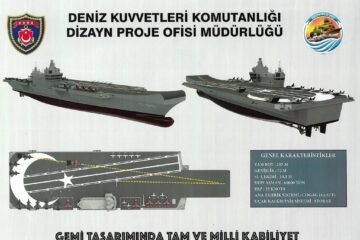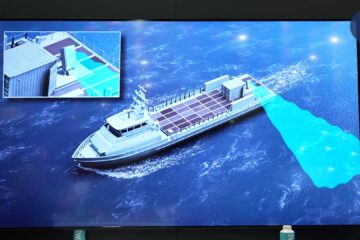From Secretary of the Navy Public Affairs
FC-2030 will be complementary to,and informed by a broad review of national shipbuilding requirements being conducted by Deputy Secretary of Defense David L. Norquist. Navy and Marine Corps uniformed and civilian leadership will be engaged in both efforts. FC-2030 will attract current and former leaders from Congress, leaders from the U.S. shipbuilding and supporting technology industries, current and former Department of Defense leaders, as well as thought leaders at War Colleges, think-tanks, and futurists from around the nation.
“The long-term challenges facing our nation and the world demand clear-eyed assessments and hard choices. Because we have four new Ford carriers under contract, we have some time to reimagine what comes next. Any assessment we do must consider cost, survivability, and the critical national requirement to sustain an industrial base that can produce the ships we need—ships that will contribute to a superior, integrated naval force for the 2030s and far beyond. Aircraft carrier construction sustains nearly 60,000 skilled jobs in over 46 states. It can’t be simply turned on and off like a faucet. We must be thoughtful in how we approach changes as they will have lasting impacts on our national industrial competitiveness and employment.”
Acting Secretary of the Navy Thomas B. Modly
The task force will be led by an Executive Director chosen from within the Department of the Navy’s Secretariat staff, and assisted on a collateral-duty basis by representatives from the Office of Naval Research and the Deputy Chief of Naval Operations for Warfighting Development.
Along with an executive director, the FC-2030 Senior Executive Panel will consist of thought leaders with historical records of leading and contributing to large change in maritime defense strategies and programs. Former Senator John Warner of Virginia has agreed to serve as the Honorary Chairman of the Executive Panel. Former Secretary of the Navy John Lehman, former acting Deputy Secretary of Defense Christine Fox, former Deputy Undersecretary of the Navy Seth Cropsey, and former Congressman Randy Forbes have agreed to serve as Executive members of the panel.
“Our future strength will be determined as much by the gray matter we apply to our challenges as the gray hulls we build,” said Modly. “We need the best minds from both inside and outside of government focused on this issue.”

The study will be conducted with the assistance of the Naval University System (U.S. Naval Academy, Naval War College, Marine Corps University, and Naval Postgraduate School) as well as eligible Federally Funded Research and Development Centers (FFRDCs) and Naval Warfare Centers.
The goal at the end of the study is to provide a report to the secretary of the Navy detailing a vision of the competitive global security environment and the role of carrier-based naval aviation in that future context. Considerations will include expected principles of deterrence, global presence missions, protection of American economic security, as well as potential combat with possible adversaries.
The study will also define likely constraints of means in terms of future defense budgets, as well as avenue to contemplate future possible technologies not yet invented that could change the stakes of carrier-based naval aviation in all phases of global competition.
Finally, the report will provide options for the Department of the Navy in requirements for different various future aircraft (manned and unmanned, nuclear and/or conventional) carriers, to be used in future months and years in developing guidance to industry. The study will also examine how best to utilize and evolve the existing carrier fleet, including the more flexible and adaptable Ford Class, to meet the challenges of advanced long-range weapons that will extend and expand contested areas in the future.






